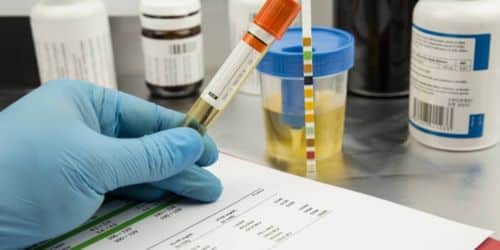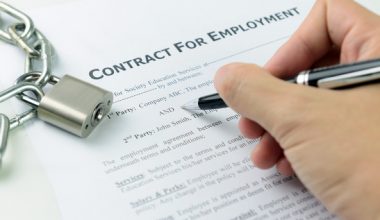Conducting drug tests is part of the pre-employment screening exercises for most companies. They do this to ensure a healthy working environment for not just the new employees but for the existing staff as well. We’ll elaborate more on the importance of these drug tests in this chapter. We’ll also see the effect of drinking the night before the pre-employment drug test and what happens if you fail.
What Is A Pre-Employment Drug Test?
A pre-employment drug test is what it sounds like. It is done to detect whether a prospective employee uses illegal drugs or abuses prescription medication. It may also be used for personnel returning to work following an injury or absence, in which case it is known as a pre-placement drug test. Employers frequently ask job candidates to take a pre-employment drug test, and a job offer may be reliant on the applicant’s ability to pass. These drug tests commonly check for the usage of the following illegal drugs:
- Methamphetamines (meth, speed, crank, ecstasy)
- THC (cannabinoids, marijuana, hash)
- Cocaine (coke, crack)
- Opiates (heroin, opium, codeine, morphine) (heroin, opium, codeine, morphine)
- Phencyclidine (PCP, angel dust)
Types of Drug Testing Specimens
Urine, hair, blood, and saliva are the most common drug-testing specimen types. Urine is the most commonly used and is required for controlled drug tests, such as those performed by the United States Department of Transportation (DOT). However, urine testing has a narrower detection window than other methods, such as the more expensive hair drug test. In urine, illicit substances can be detected for five to ten days, whereas hair drug tests can detect drug or alcohol usage for up to 90 days.
Blood testing is incredibly accurate, but it is also expensive and invasive. It does, however, have a shorter detection period (minutes to hours). Finally, a saliva test (also known as an oral fluid test) is less invasive than urine testing and has a shorter detection period (7–21 hours). If an employer wants to avoid the complications that arise when an employee does not produce enough urine, a saliva drug test can be an effective alternative to urine testing.
Why Should Employers Conduct Pre-Employment Drug Tests?
If a corporation prioritizes worker safety, pre-employment drug testing can assist in limiting the hazards associated with drug abuse. An employer can discourage substance abusers from applying by mentioning on a job application that an offer of employment may be contingent on the results of a drug test. Pre-employment drug testing is essential for occupations that place individuals in high-risk areas. Because it has the potential to lower the number of costly workers’ compensation claims involving drug or alcohol usage
The National Institute on Drug Abuse (NIDA) states that:
- Drug usage may result in a fivefold increase in occupational injury claims.
- Workplace substance misuse accounts for up to 50% of all workers’ compensation claims.
- Substance abuse may result in 3.5 times more accidents.
- Substance misuse can raise the likelihood of an employee missing eight or more workdays per year by 2.5 times.
- Substance misuse may contribute to productivity is 33% lower than it otherwise would be.
Is Employee Drug Testing legal?
The legality of drug testing is developing and varies by state. Employers should seek legal advice if they have concerns about their testing program’s compliance with all applicable state regulations. There are certain broad best practice guidelines, which include that:
- Pre-employment drug testing must be disclosed to the applicant ahead of time as part of the new employee screening procedure.
- Applicants for the same position must submit to the same drug test.
- Drug tests must be performed in a state-certified laboratory.
- Pre-employment drug testing is a form of occupational health care.
While the majority of urgent care providers can administer pre-employment drug tests, many do not have an in-depth understanding of all sorts of occupational drug tests. They are also not the best people to help a business design a company’s drug testing program. Workplace drug testing falls within the purview of occupational health providers.
What Happens If I Fail A Pre-Employment Drug Test?
In most circumstances, when you fail a pre-employment drug test, you will not qualify for the job. Companies that demand pre-employment drug tests must make it clear that the offer of employment is conditional on the new worker passing a drug screening test. This is commonly stated in the following:
- The job advertisement
- Letters of recommendation
- Additional official documentation
This provides your prospective employer the power to refuse you if you fail a pre-employment drug test. If your employer suspects that you’re using substances on the job or that your off-the-job usage is affecting your work and the safety of others, they may compel you to submit to a pre-employment drug test and agree to random drug screening during your employment. A period of time usually elapses between a job offer and a pre-employment drug test. If you can’t stop using drugs and alcohol for so long, it’s probably time to reconsider your substance abuse and see if treatment could help.
Possible Things That Will Happen When You Fail a Pre-Employment Drug Test
If you fail a pre-employment drug test, a few things may happen. Depending on your state of residence, you may be prevented from applying for a specific position in a corporation, or you may be able to dispute the outcome.
Following a failed pre-employment drug test, the following are some of the possible outcomes:
- Your application may be rejected by the employer. If this occurs, you may still be able to reapply for the position or apply for other opportunities within the same organization.
- You may be allowed to attend a rehabilitation program before being allowed to reapply for the job. If this occurs, you will almost certainly be required to retake the test after completing the program.
- If you are a recreational user, your employer may grant you another chance to pass the test at a later date. It may not harm your prospects of employment depending on the position, though this is uncommon.
- If you apply for a job at the Department of Transportation, they will almost certainly not hire you. Because of the nature of their business, they have slightly different rules than other corporations.
- If the position you’ve applied for is exceptionally tough for the business to fill, you may still be considered for the post. If finding a qualified applicant proves substantially more difficult than usual, they may still consider you rather than reject your application outright.
What happens when you fail a pre-employment drug test is usually determined by a couple of factors. What occurs next is determined by the nature of the task and the firm that requested the test.
Can You Counter Positive Drug Tests?
It goes without saying that there are numerous circumstances when a drug test may not be totally accurate. False positives are common owing to additional medications the employee may be taking or inadequate testing circumstances at the lab. In that instance, may you challenge your drug test result?
You can counter positive drug tests if you can show that you’re taking medication that may have influenced the results. Employers should bear this in mind in the event of a failed drug test because many over-the-counter (and prescription) medicines might impact the findings.
Knowing which medications may have influenced a drug test result will assist you in determining whether you have a valid case when attempting to overturn a false positive drug test.
Is a Failed Pre-Employment Drug Test Recorded?
Pre-employment drug testing is normally done privately. In other words, it’s a process that involves you, the laboratory that evaluates the specimen, and the company that requested the test.
A failed pre-employment drug test will not be recorded on your record. The possible employee and the firm will both receive the test results, but there is presently no database that stores your test results. They are also not subject to public records.
In general, if you fail your pre-employment drug test, the corporation cannot divulge your results to any other prospective employer. This means you can easily apply for a different job, and no one will know you previously failed a drug test.
However, in some cases, a failed drug test will be recorded on your public record. If you’re on parole, for example, a positive drug test may result in a breach of your parole. In certain cases, your test result will almost certainly be made public, and you may even wind up in prison.
Can I Retake A Pre-employment Drug Test?
If you failed your drug test and want a second opportunity, you can always contact your employer. Keep in mind that decisions in these circumstances may differ, particularly in vocations demanding higher levels of safety.
A pre-employment drug test can be retaken if the employer deems it acceptable. However, if they agree, you may have to fund the additional test yourself in some situations. You can retake a drug test, but you will not be required to provide a new specimen to be tested.
If you retake a drug test, the first sample you provided to the lab will be used to test you on the second occasion. Unless you have specific mitigating circumstances, it’s unlikely that you’ll be able to provide a new specimen.
If you use recreational drugs, you should apply for jobs that do not require drug testing prior to a job offer. Not all companies want to drug test their employees before a period of employment.
However, you can also be honest with any prospective employer and inform them that you’ve been using drugs recreationally recently. It’s better to be open than try to hide something that’ll likely appear in the test results.
Retaking the drug test may appear to be a smart alternative if you believe it would offer you a better shot at the job you desire, but if you have illegal drugs or alcohol in your system, it is likely a waste of your and the employer’s time.
Drinking The Night Before A Pre-employment Drug Test: Is It Advisable?
Alcohol is made up of numerous complicated components. As a result, while some may dissolve within a few hours, others may remain in the body for several days. This could be recorded in your blood or urine sample records if it fails. As a result, drinking the night before a pre-employment drug test is not advisable.
How far back does pre-employment drug test?
However, hair analysis can detect the presence of most drugs for up to 90 days. Companies may offer testing for a wider variety of drugs, but the most common panel includes a urine test for cannabis, cocaine, amphetamines, methamphetamines, benzodiazepines, and opiates.
Will I get drug tested on my first day of work?
Drug testing is common practice for many companies, and many prospective workers must expect to undergo such a test. The exam is usually taken at a third-party lab before the first day of work. No special preparation is needed for this type of test, as it is typically a urine sample.
Will I be contacted if I fail a drug test?
If you pass the company’s drug test, you probably won’t hear anything, but if you don’t, a Medical Review Officer will get in touch with you (MRO). The MRO may contact you either via the company that footed the bill for the exam or directly.
Will an employer accept a negative dilute drug test?
Positive dilution, also known as a “positive dilute,” always indicates a positive drug test result. Reporting a test as “Negative Dilute” is not a violation of company policy because it is not a positive result.
Do you take a drug test same day as interview?
After you’ve been interviewed, your potential employer will let you know when you’ll have to take a drug test. No prospective employee has ever been subjected to a drug test during the interview process. On the day of the interview, however, you may be required to take one elsewhere. So, on the day of the interview, be sure to bring a drug test with you, just in case.
Does onboarding mean I passed the drug test?
That’s right; it indicates that you’ve successfully completed a drug test and a background check.
In Conclusion,
Conducting a pre-employment drug test is important for companies that are looking to employ people in high-risk areas. Hence, if you are looking to gain employment in any of these areas, it’s advisable to stay off drugs completely. Also, you should abstain from drinking the night before a pre-employment drug test so that it won’t affect your results.
Frequently Asked Questions
What drug test is most common for pre-employment?
Urinalysis is the most common drug test for pre-employment.
Do they watch you pee for a pre-employment drug test?
No, they simply observe you taking the breathalyzer, and when they send you for the urine test, they simply accompany you to the restroom and give you instructions.
Should I be honest about not passing a drug test?
If you know you won’t pass the drug test, be honest enough to admit it and stop wasting your recruiter’s time.
Related Articles
- Steps to Register New Pharmaceuticals
- COMMERCIAL HEALTH INSURANCE: How it Works & Top Largest Commercial Health Insurance Companies
- Financial Literacy Tests to Track your Progress Efficiently(+ quick guide and tips)
- Relationship Marketing: The A-Z Guide (+ Free Tips)
- TEST MARKETING: Best Practices to Scale any Business (+ Helpful Reviews)
- NEW EMPLOYEE ORIENTATION: Detailed Checklist, Template & Examples






